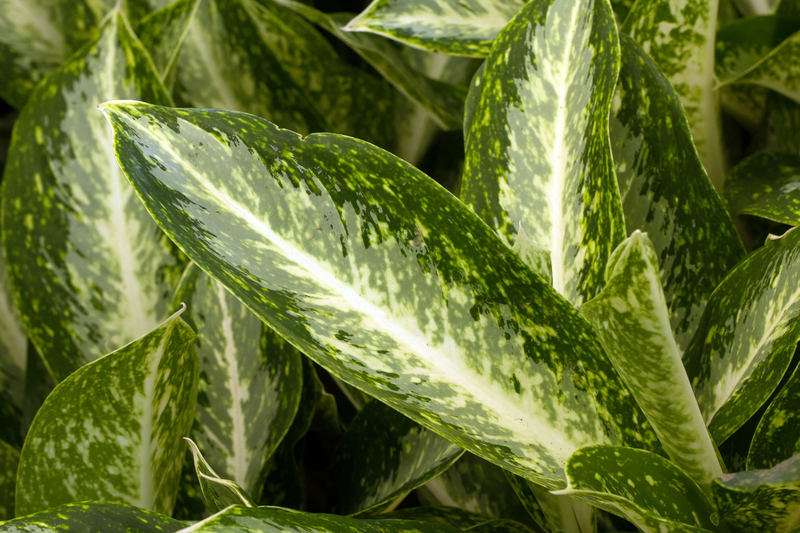Unlock 3 Key Tips for Efficient Weed Control
Posted on 29/06/2025
Unlock 3 Key Tips for Efficient Weed Control
Dealing with stubborn weeds is a challenge that every gardener and landscaper faces. Whether you're maintaining a lush green lawn or managing expansive agricultural fields, efficient weed control techniques are essential to keep unwanted plants at bay. By understanding proven strategies, you can save time, effort, and resources while creating healthier, more visually appealing green spaces.
In this comprehensive guide, we'll unlock three pivotal tips that will transform your approach to weed management. These methods are ranked among the most practical, sustainable, and effective solutions by experts in the field. Read on to discover how to gain control over weeds and foster a thriving landscape.

Why Efficient Weed Control Matters
Before delving into the core strategies, let's understand why maintaining efficiency in weed control is of paramount importance:
- Weeds compete for resources - Unwanted plants drain valuable nutrients, sunlight, and water from your crops or ornamentals.
- Impact on aesthetics - Overgrown weeds create unsightly landscapes that reduce curb appeal.
- Disease and pest harbors - Many weeds act as hosts for pests and pathogens that may attack desirable plants.
- Labor and cost reduction - Efficient methods minimize recurring efforts and reduce expenses on herbicides and manual labor.
- Environmental protection - Thoughtful weed control methods prevent chemical overuse and support eco-friendly garden management.
Through smart and targeted tactics, it's possible to significantly reduce weed problems and their impact.
Tip 1: Start with Prevention - The Foundation of Effective Weed Management
The adage "an ounce of prevention is worth a pound of cure" rings especially true when it comes to integrated weed control. Instead of battling mature weeds, focus on techniques that prevent their emergence and establishment.
Apply Mulch Strategically
Mulching is among the easiest and most eco-friendly weed prevention tactics. Mulch acts as a physical barrier, blocking sunlight which many weed seeds need for germination. It also helps retain soil moisture and improves soil structure over time.
- Organic mulches such as bark chips, leaves, straw, or compost provide additional nutrients as they decompose.
- Inorganic mulches (gravel, landscape fabric) offer longer-lasting weed suppression for paths and ornamental beds.
- Apply a minimum 2-3 inch thick layer for best weed control results.
- Regularly inspect and replenish mulch to ensure continued coverage.
Dense Planting and Ground Covers
Planting ground covers or densely spaced flowers and vegetables leaves little room for weeds to take root. The dense foliage and root systems naturally suppress weedy contenders.
- Choose aggressive ground cover species suited to your climate and sunlight levels (e.g., creeping thyme, vinca, sedum).
- Utilize cover crops in veggie gardens during off-seasons to outcompete winter weeds and improve soil health.
Good Cultural Practices
Regularly clean tools and footwear when moving between different parts of your garden to avoid spreading weed seeds. Also, use high-quality, certified seeds and compost to reduce accidental introduction of new weed species.
Tip 2: Master Early Detection and Targeted Removal
Effective weed management goes beyond prevention. Vigilantly monitoring your garden and acting quickly at the first sign of a problem can make a huge difference in your success with weed eradication.
Frequent Inspection Is Key
- Make a habit of walking through your landscape at least once a week.
- Check for weed seedlings and sprouts before they mature and set seed.
- Pay special attention after rain or irrigation, as moist soil encourages germination.
Hand Pulling and Mechanical Methods
When caught early, most weeds can be easily removed by hand or with a hoe. This is especially effective for annual weeds and those with shallow root systems.
- Pull weeds while the soil is moist for easier root removal.
- Ensure you extract the entire root, as leftover fragments can regenerate.
- Use specialized weeding tools for deep-rooted perennials like dandelions or thistles.
- Dispose of removed weeds promptly, especially if they have already formed flowers or seeds.
*Tip:* Wearing garden gloves and using ergonomic tools can reduce fatigue during larger weeding sessions.
Use Targeted Herbicides Wisely
For areas or infestations where manual removal is impractical, consider using selective herbicides. Modern products allow precise application with minimal collateral damage.
- Opt for post-emergent herbicides for actively growing weeds and pre-emergent formulas to disrupt germination.
- Choose products designed for your specific weed species and plant types.
- Always follow label instructions and apply on calm, dry days to avoid drift onto desirable vegetation.
- Consider organic options like vinegar-based sprays for small-scale or environmentally sensitive areas.
*Note*: Herbicide resistance is a growing concern. Rotate chemistries and integrate additional methods to delay the buildup of resistant weed populations.
Tip 3: Implement Long-Term, Integrated Weed Management Strategies
Relying on a single method often leads to diminishing returns as weeds adapt and persist. Integrated weed management (IWM) employs a combination of cultural, mechanical, biological, and chemical tactics to maintain long-term control and promote ecosystem balance.
Rotate Crops and Strategies
In agriculture and kitchen gardens, crop rotation can break the weed life cycle. Rotating crops disrupts habitat for weed species that prefer certain plants or soil conditions.
- Alternate between shallow- and deep-rooted crops to disturb habitual weed roots.
- Rotate weed management methods (cultivation, mulching, herbicide) year to year.
Encourage Beneficial Organisms
Biological control involves harnessing natural weed enemies, such as insects, fungi, or grazing animals (e.g., goats for brushy areas).
- Introduce or protect insect herbivores that feed on invasive weed species.
- In larger properties, targeted grazing can help suppress seed production of certain weedy plants.
Soil Health Management
Healthy, balanced soil discourages weed invasion and supports robust crop and turf growth.
- Test and adjust soil pH & fertility for optimal plant health and competition against weeds.
- Reduce soil disturbance (no-till methods) which can bring buried weed seeds to the surface.
- Encourage earthworms and beneficial microbes through organic amendments and reduced pesticide use.
Monitor, Evaluate, and Adjust
Weed management is an ongoing process. Maintain records of which strategies work best for your site, and remain flexible, adapting your approach based on emerging issues and seasonal fluctuations.
- Document weed outbreaks, weather patterns, and control outcomes.
- Stay informed about new resistant weed biotypes and management advances.
Bonus Tips for Weed Control Success
- Act quickly when you spot new, aggressive weed species--early eradication is far easier than letting problems escalate.
- Keep borders and pathways well-maintained, as these often serve as weed entry points.
- Invest in quality tools that make regular weeding less of a chore.
Remember, consistent and informed efforts always yield the best long-term results.
Common Mistakes in Weed Control and How to Avoid Them
- Ignoring weeds during their seedling stage - Seedlings are easiest to control; don't wait until they're mature!
- Failing to replenish mulch - Thin mulch loses its effectiveness against sunlight and weed pressure.
- Over-reliance on chemicals - This can harm beneficial soil organisms and cause resistant weeds to develop.
- Overwatering - Excessive moisture encourages weed germination. Water efficiently, targeting desirable plants.
- Improper tool use - Incomplete removal of weed roots allows for regrowth. Use the right tool for each weed type.
Conclusion
Unlocking efficient weed control is achievable when you integrate prevention, early intervention, and long-term ecosystem-based strategies. Start with prevention (mulching, dense planting), move to swift detection (regular inspection and removal), and adopt an integrated approach for sustainable success.
By applying these three key tips for effective weed control, you'll cultivate a healthier, more beautiful, and easier-to-maintain landscape. Whether you're tending a backyard garden, managing a golf course, or overseeing farmland, combining these best practices will ensure weeds never get the upper hand again.
Take action today: review your current weed management methods and start implementing these expert-backed strategies for stunning, weed-free results.

Frequently Asked Questions (FAQs) about Weed Control
What are the best organic methods for efficient weed control?
Organic approaches focus on prevention (mulching, ground covers), manual removal, and using natural weed killers (such as boiling water or vinegar-based sprays). Crop rotation and soil health improvement also play crucial roles.
How often should I inspect my garden for weeds?
Regular inspection--ideally weekly--allows you to catch weed outbreaks early, making removal quicker and easier. High rainfall or rapid growth periods may require more frequent checks.
Are chemical herbicides always necessary?
Herbicides are not always necessary. They can be used sparingly for severe infestations, but integrating cultural and mechanical methods often yields better long-term control and supports a healthier ecosystem.
Ready to Experience Truly Efficient Weed Control?
Implement these three key tips and watch your weed management efforts become more successful, time-efficient, and environmentally conscious. Your garden--and your back--will thank you!
Latest Posts
Discover the Joy of Container Gardening
Innovative Zen garden ideas for peaceful outdoor spaces
Transforming Your Yard into a Kid-Friendly Haven
Transforming Your Garden with Beautiful Seating Arrangements

